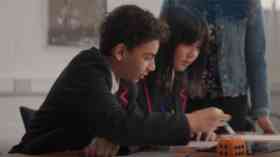Bringing science to your doorstep
 Science can be a divisive subject – whether we like to admit to it or not. It’s a subject that can often be labelled as ‘just for geeks’ or as something that leads to a narrow range of career options. It feels like it is inextricably linked to that stereotypical image of a mad scientist with big hair, and a big attitude, with a beaker in their hand.
Science can be a divisive subject – whether we like to admit to it or not. It’s a subject that can often be labelled as ‘just for geeks’ or as something that leads to a narrow range of career options. It feels like it is inextricably linked to that stereotypical image of a mad scientist with big hair, and a big attitude, with a beaker in their hand.
For many young people, this image is humorous, relatable, but ultimately off‑putting. What teenager wants to end up being Einstein when they could be Harry Styles?
At the British Science Association (BSA) what we’re trying to do is to show that science isn’t just for geeks, that it isn’t something that should be seen as elitist, but it should certainly be something everyone has a say on.
Science and culture
Science is part of everything – it touches everyone’s daily lives. It also forms a significant part of our culture, our history and the way that society works.
There are the obvious links between science and society – such as using a smartphone, but we also like to highlight the more mundane links with our audiences, such as making a cup of tea. Every cup you make, you are using the scientific method by changing variables to achieve that perfect cuppa.
But it’s not just about pointing out where science touches peoples’ lives, we also want them to feel some ownership over its direction.
Something for everyone
British Science Week is an annual campaign that we organise at the BSA. It has been running since 1994, when it was known as National Science Week. Then it became National Science and Engineering Week, and ultimately we’ve settled on the name British Science Week.
This is year it is taking place 13-22 March. Through our website we offer free activity and support resources, providing organisers with all the guidance and encouragement needed to host an event. Event organisers typically include parents, schools, community groups and organisations; with the resulting programme a hugely varied, eclectic mix of scientific activities. Our goal is to reach out to people from all walks of life through fun and accessible scientific content, and removing the barriers to engagement. We believe that anyone can engage and contribute to science – and this is especially true during British Science Week.
The aim of the Week is to get the nation excited and engaged in science, either through attending events or taking part in activities such as citizen science projects. We have estimated that over 1.2 million people engaged with science during the British Science Week in 2014.
A big part of what we do in the run up to, and during, British Science Week is work with teachers and schools across the country to support them in running activities and events with their students in the classroom.
Supporting teachers
For the second year in a row, we are asking teachers and technicians around the country to get involved with our Demo Day campaign by pledging to run a demo with their students.
This year, Demo Day is on Thursday 19 March and we want to inspire secondary school teachers and technicians to explore new concepts, provoke discussions and generate excitement through running science demonstrations.
We have made a new downloadable resource available on our website, called Demo insights, to help teachers put on the best demo ever for their students. It includes tips, stories and thoughts from professional science communicators, as well as some of the dos and don’ts.
This is in addition to the wide range of resources already available as part of Demo Day, including Demo: The Movie, a 30-minute film which follows science teacher Alom Shaha as he goes on a journey to explore the use of demonstrations in science teaching.
In return, we want teachers to send us their pledge to say that they will hold a science demo at their school on Thursday 19 March to celebrate Demo Day and British Science Week. These pledges are put on a map of the UK to show the massive reach Demo Day will have on school children everywhere.
Science on your doorstep
British Science Week isn’t just about loud bangs in the chemistry lab – we also want to celebrate the links between effective communication, art & design and science. We inspire young people to do this with activities like our poster competition for schools.
This year, the theme is ‘science on your doorstep’ and we want young people to take a closer look at their local environment and tell the story of the science around them. We have intentionally left the theme open as we want to inspire young people to discuss what science means to them – it could be through the engineering behind local structures or buildings, the geography of their region, inventions or discoveries made in their hometown, or famous scientists who lived down the road.
We’ve also teamed up with a number of partner organisations on some large-scale citizen science projects.
The first of these is Nature’s Calendar, which is organised annually by the Woodland Trust. This year, as part of British Science Week, we want the public to help the Trust’s scientists to calculate how quickly spring moves across the UK – does spring creep up on the UK at walking pace or at running speed?
The other citizen science project we’re working on is Worm Watch Lab – a project run by Zooniverse.
The project involves monitoring nematode worms online and clicking when one of the worms lays an egg. Believe it or not, by monitoring the number of eggs laid, scientists are able to better understand how our genes affect brain function.
However, in order to get a model that is accurate, each worm film needs to be watched 10-15 times and there are over 74,000 films. We are aiming to get 100,000 classifications – a classification is watching one video – during British Science Week, to help the Worm Watch Lab scientists get through the vast amounts of data that needs to be analysed.
Grants and funding
British Science Week offers a great way for schools to celebrate the breadth of science and its cross-curricular links. On our website we provide resources, student worksheets, activity packs and guides to help support schools and colleges run their events and activities.
We also provide funding through our grant scheme, which is open in the autumn term prior to British Science Week. We run three grant schemes for schools: the Kick Start grants, which are open to schools in challenging circumstances; the Welsh grants, which are open to schools in Wales; and the Scottish grants, for schools in Scotland.
With the grants, the focus is to engage hard-to-reach audiences and to improve the links between schools and their communities.
In order to achieve our vision of having science seen as a fundamental part of culture and society, we understand that those discussions can’t just take place in the classroom, but the local community needs to be involved too. That’s not always easy, which is why we provide the support that we do to schools across the UK.
Science is our middle name
British Science Week offers a number of ways for schools and colleges to get involved in a national science celebration, from small-scale activities held during a lesson to all-day events that involve not just the students, but parents and the rest of the community as well.
However, there are other ways to celebrate science and culture in the UK with the BSA. We have been running the CREST Awards scheme for over two decades now – which encourages students to design, build and present a project, incorporating a range of different skills in order to succeed.
Last year, we announced our partnership with The Duke of Edinburgh Award, so that students who complete a CREST Award can use this in the ‘skills’ section of their Award – an area where students are asked to develop their practical skills and personal interests.
Enquiry-based learning is something the BSA really encourage, not just because it allows students to get hands-on with science, but also because it seems to inspire a wide range of students at all levels.
Last year, 33,000 young people completed a CREST Award – 51 per cent of the awardees were girls. And these figures are not an anomaly – year after year we see an even gender split on the numbers of completed Awards.
Following some research and using anecdotal evidence, we believe that this is because CREST Awards recognise achievements in communication, team work, research and presentation, which appeals to the learning styles of both genders. It gives students an opportunity to complete a science project that takes into account the real world context and the implications beyond their own work.
Science & Engineering
We also organise the National Science + Engineering Competition, which recognises the achievements of 11-18 year olds on a grander scale. Students who have completed a science or engineering project are selected via regional and online heats. The top 200 projects (from individuals or teams) present their work at The Big Bang Fair in March – the winners of the competition are crowned UK Young Engineer and UK
Young Scientist of the Year
These students then go on to represent the UK at international competitions and become ambassadors for science, technology, engineering and mathematics (STEM) by taking part in media interviews, panel debates, and mentoring schemes.
Ultimately, our vision for all of our programmes, from British Science Week to the CREST Awards, is to create a world where people feel comfortable with science, but most importantly feel able to contribute to that world, whether they are a scientist or not.
Further information
www.britishscienceassociation.org
www.britishscienceweek.org
Latest News
08/01/2026 - 10:30
The government is launching a new app allowing students to view their GCSE results on their phones for the first time from this summer.
08/01/2026 - 09:45
Education Business LIVE has announced that Professor Samantha Twiselton OBE of Sheffield Hallam University will speak at the event in March 2026, delivering two thought-provoking sessions focused on initial teacher training and SEND provision.
07/01/2026 - 10:10
Solve for Tomorrow is a free, curriculum-linked programme which is mapped to Gatsby Benchmarks 4, 5, and 6, helping teachers embed careers education without adding to workload.
06/01/2026 - 10:24
London's universal free school meals programme has not led to improvements in pupil attainment during its first year, but has eased financial pressure and reduced stress for families.
05/01/2026 - 10:44
New regulations have come into force from today, banning adverts for unhealthy food and drinks before 9pm, and online at all times.







